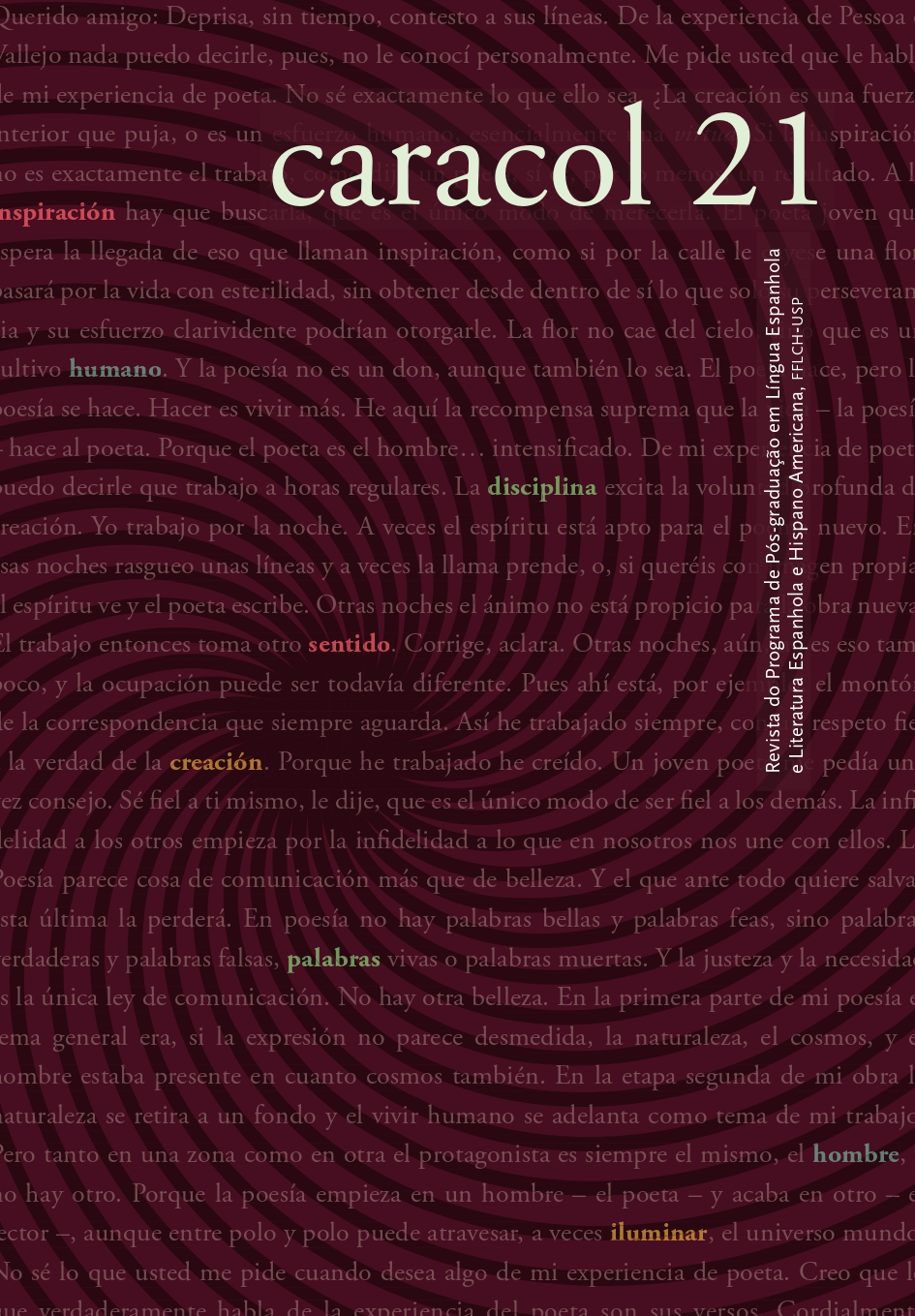La hora Violeta. Feminismo y canción protesta en la obra de Nacho Vegas
DOI:
https://doi.org/10.11606/issn.2317-9651.i21p1100-1119Palavras-chave:
Nacho Vegas, Violeta Parra, Violética, Canção , Protesto, FeminismoResumo
En esta oportunidad, nos detendremos en la última obra del cantautor y poeta Nacho Vegas, Violética, de 2018, disco publicado a casi un año del centenario del nacimiento de Violeta Parra, en el que se recupera la figura y la voz de la artista chilena. Nos interesa, en particular, analizar cuáles son las razones del homenaje y qué vínculos tienen las producciones de ambos músicos. De las “canciones agitadóricas” de Parra a la canción comprometida del asturiano, los sonidos de la tradición popular se entrelazan con los más actuales y esta es reivindicada tanto en su rol creativo como en su rol político. En el seno del debate sobre el feminismo, además, la grabación de Vegas da cuenta desde su título, pasando por la interpretación de sus piezas con cantantes mujeres y la presentación de ideas desde el punto de vista femenino, de una ética, la del activismo de la “ola violeta” y el de la propia Parra.
Downloads
Referências
Alonso, Sebastián. “La Canción del Día: ‘La última atrocidad’ muestra que Nacho Vegas sabe hacer canciones divertidas y con mensaje”. In: Jenesaispop. 2018. Disponible en: <https://jenesaispop.com/2018/07/17/336524/la-canciondel-dia-la-ultima-atrocidad-muestra-nacho-vegas-sabe-canciones-divertidasmensaje/>. Acceso en 12 nov. 2019.
Barrero, Miguel. “Nacho Vegas: la idea, la poesía y la canción”. Entrevista a Nacho Vegas. En: El Cuaderno, Gijón: jun. 2017. Disponible en: <https://elcuadernodigital.com/2017/06/01/nacho-vegas-la-idea-la-poesia-y-lacancion/>. Acceso en 12 nov. 2019.
Butler, Judith. “‘Nosotros el pueblo’. Apuntes sobre la libertad de reunión”. In: Alain Badiou et al. ¿Qué es un pueblo? Buenos Aires: Eterna Cadencia, 2014, 47-67.
Catalán, Diego. Arte poética del romancero oral. Parte 1ª. Los textos abiertos de creación colectiva. Madrid: Siglo XXI, 1997.
Eco, Umberto. Apocalípticos e integrados. Barcelona: Lumen, 1990.
Garrido, Martín. “‘Que sea la canción la que mande’. Entrevista a Nacho Vegas”. In: Los inrockuptibles. Buenos Aires: jul. 2018. Disponible en: <https://losinrocks.com/entrevista-a-nacho-vegas-que-la-cancion-mande-9ecfb6d060d0>. Acceso en 20 oct. 2019.
Lenore, Víctor. Indies, hipsters y gafapastas. Crónica de una dominación cultural. Madrid: Capitán Swing, 2014.
Lynskey, Dorian. 33 revoluciones por minuto. Historia de la canción protesta. Buenos Aires: Malpaso, 2018.
Miranda, Paula. “Décimas autobiografiadas de Violeta Parra: Tejiendo diferencias”. In: Revista de la Facultad de Filosofía y Humanidades de la Universidad de Chile, Santiago de Chile: 2000. Disponible en: <https://web.uchile.cl/publicaciones/cyber/13/tx7.html>. Acceso en 20 oct. 2019.
Ong, Walter. Oralidad y escritura. Tecnologías de la palabra. México: Fondo de Cultura Económica, 1986.
Parra, Violeta. Poesía. Edición general de Ernesto Pfeiffer y Cristián Warnken. Recopilación, estudio y notas de Paula Miranda. Valparaíso: Editorial de la Universidad de Valparaíso, 2016.
Peñas, Enrique. “El feminismo es el único movimiento con capacidad de desborde”. Entrevista a Nacho Vegas. In: Mondosonoro. Jun. 2018. Disponible en: <https://www.mondosonoro.com/entrevistas/nacho-vegas-violetica/>. Acceso en 20 oct. 2019.
Riva, Sabrina. “Una muchacha y una guitarra. Nuevas cantautoras latinoamericanas”. In: El Cuaderno, Gijón, 2017. Disponible en: https://elcuadernodigital.com/2017/09/15/nuevas-cantautoras-latinoamericanas/. Acceso en 20 oct. 2019.
Romano, Marcela G. “Parodia y deconstrucción en la canción de Joan Manuel Serrat”. In: Revista de Estudios Hispánicos, 20, 1993, 57-74.
Romano, Marcela G.; Lucifora, Maria Clara y Riva, Sabrina (dirs.). Un antiguo don de fluir. La canción, entre la música y la literatura. Mar del Plata: EUDEM, 2021.
Val, Fernán del y Héctor Fouce. “De la apatía a la indignación. Narrativas del rock independiente español en época de crisis”. In: Methaodos. Revista de Ciencias Sociales, 4 (1), 2016, 58-72.
Vegas, Nacho. “Nacho Vegas elogió a Violeta Parra: ‘En ella encuentro una voz y una personalidad únicas’. Entrevista a Nacho Vegas”. In: La Viola, Bs. As.: 2018. Disponible en: <https://tn.com.ar/musica/hablamos-con/nachovegas-escuchando-violeta-parra-encuentro-una-voz-y-una-personalidadunicas_880358>. Acceso en 12 nov. 2019.
Discografía
Grupo Cultural Xara. El Son nos Cantares de la Revolución d’Ochobre de 1934 (I). CD. Oviedo: Fono Astur, 1996.
Nuberu. “Aida de la Fuente”. Disponible en: <https://www.youtube.com/watch?v=rVMd6Z2xEgM>. Acceso en 15 nov. 2019.
Parra, Violeta. Las últimas composiciones. CD. Buenos Aires: Warner, 1999.
Vegas, Nacho. Cómo hacer crac. CD. Madrid: Marxophone, 2011.
Vegas, Nacho. Resituación. CD. Madrid: Marxophone, 2014.
Vegas, Nacho. Violética. CD. Madrid: Marxophone, 2018.
Videografía
Sol, Jo (Director) y María Bas Baldó (Productora). La última atrocidad. Cortometraje. Realización por Jo Sol, 2018.
Downloads
Publicado
Edição
Seção
Licença
Copyright (c) 2021 Sabrina Riva

Este trabalho está licenciado sob uma licença Creative Commons Attribution-NonCommercial 4.0 International License.
Autores que publicam nesta revista concordam com os seguintes termos:
- Autores mantêm os direitos autorais e concedem à revista o direito de primeira publicação, com o trabalho simultaneamente licenciado sob a Licença Creative Commons Attribution que permite o compartilhamento do trabalho com reconhecimento da autoria e publicação inicial nesta revista.
- Autores têm autorização para assumir contratos adicionais separadamente, para distribuição não-exclusiva da versão do trabalho publicada nesta revista (ex.: publicar em repositório institucional ou como capítulo de livro), com reconhecimento de autoria e publicação inicial nesta revista.
- Autores têm permissão e são estimulados a publicar e distribuir seu trabalho online (ex.: em repositórios institucionais ou na sua página pessoal) a qualquer ponto antes ou durante o processo editorial, já que isso pode gerar alterações produtivas, bem como aumentar o impacto e a citação do trabalho publicado (Veja O Efeito do Acesso Livre).




